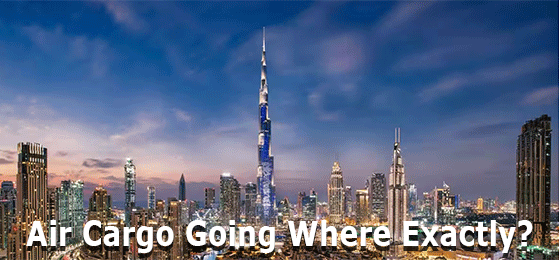
|
April 2025 will not go down in history for being peaceful and unexciting. This probably means that delegates travelling to Dubai on April 15th for IATA’s WCS will come to the event with a bunch of burning questions. Choosing the timing for an event is a skilful exercise; agendas will remain in conflict no matter what date is selected, but in the end all we require is to meet and benefit from Air Cargo leaders’ wisdom and some social entertainment. Some considerable time ago, when IATA decided to convene the air cargo industry to DXB on April 15th this year, it is unlikely they anticipated the almost unexpected turn international trade would take at the beginning of this month. For this reason, the IATA Op editorial sounds interesting, without shining in dazzling colours, compared to the charged scenario international trade is going through at this point in time.
This is how IATA ends its OpEd: “As IATA, Emirates SkyCargo and dnata welcome industry stakeholders to WCS 2025, the focus will be on driving innovation, enhancing efficiency, and ensuring air cargo remains a pillar of global trade. WCS 2025 is more than just an industry event—it’s a call to action. The discussions in Dubai will shape the industry’s trajectory for years to come. The question is not whether air cargo needs can navigate the current environment, but how quickly it can adapt to new global realities. The answer will define the future of air cargo.”
If the Trump anti-globalization views prevail, this means that one of the greatest players in the complex global supply chains, i.e. the USA, will no longer maintain the conditions for significant volumes of cargo to move across the world to reach the U.S. consumer. Trump seems to be working as a surrogate to the Seattle protesters 1999 and seems to have best intentions to deliver a world with stronger borders to protect American interests by putting brakes to globalization. Whether this actually serves the American interests remains to be verified, but it could cause a complete U turn in the global development. If this program comes to fruition, leaving the doom and gloom scenarios aside, in our view there are two alternatives: a) air cargo will thrive in Asia, Africa and Europe, perhaps in Latin America, if these areas remain in a free trade situation, whilst U.S. and Americans re-focus on their own internal market; b) all areas retrench on their own markets, starting or revamping piecemeal autonomous economies, which will struggle to keep all their supplies in balance and this will make international transport and logistics less important than it has been in the last four decades at least.
From another point of view, the ‘originator of the trade’, i.e. the importer, the customer, the customer’s client, the consumer, which for many years we used to identify with somebody in the USA, will have to be spotted somewhere else. Obviously this is not a black and white picture, but the weight of the USA in global trade has always been predominant, so losing some of it may lead to declining international trade, in particular in air cargo.
IATA is expecting an expanding air cargo market: “Air cargo was a standout performer in 2024, growing 11.3% — outpacing passenger demand; e-Commerce expansion and disruptions in sea shipping kept demand high, with yields 39% above 2019 levels. Looking ahead, 2025 is set for another 5.8% growth, but challenges loom: geopolitical uncertainty, inflation, and potential U.S. policy shifts, including new tariffs.” In our opinion this expectation may actually come true, because the changes that are triggered by the new policy will take some time to settle down, but the 50% decrease in volumes’ growth may start immediately and continue, up to the point when it could take a reverse trend. If the contraction is huge, the capillarity of logistics services will become impossible, and will no longer exist, in particular in weaker areas.
IATA continues with a spontaneous truism: “These pressing issues will take center stage at the IATA World Cargo Symposium (WCS) 2025 in Dubai from the 15-17 April. Industry leaders will explore how air cargo can navigate an increasingly complex global trade environment.” This is the language you would normally use to attract participants and confirm that the issues they have in mind will be right in focus at the summit. This time, industry leaders will explore how air cargo can navigate an increasingly complex global trade environment, quite literally… Let us hope for fair winds and following seas. At this point it is difficult to say anything more meaningful than that.
IATA sets the pace with three main conversations: “the symposium will feature plenary sessions, specialized tracks, workshops, and executive summits, addressing: digitalization (the role of AI and automation in the future of air cargo); sustainability (strategies for decarbonization, reducing single-use plastics and ESG reporting; risk and resilience (navigating geopolitical uncertainty, regulatory shifts, and supply chain disruptions).” In 2024 these evergreens could actually hit the news, in 2025 this possibility seems remote, but let us do some cherry-picking of the statements . . .
“The strength of e-commerce will represent a growing portion of air cargo business. Currently, e-commerce averages about 20% of cargo business industry-wide, but it is expected to grow to at least a third of all cargo shipments. Given that, by 2027, e-commerce is expected to be an $8 trillion market segment, the sector stands to reap a significant reward if it can get its product correct”, but more likely the “fireside chat on IATA’s Digitalization Leadership Charter, which was established to accelerate and sustain the industry's digital transformation” with 17 signatories in 2024, may be disturbed by the suspicion that de minimis and tariffs could blur our rosy expectations. Let us just hope that nobody will majestically descend a staircase and spell out: “Alright, Mr. DeMille, I'm ready for my close-up”. We are not at the Sunset Boulevard of international trade, but the consequences on e-commerce of the decisions taken in April 2025 in Washington may linger for several years and by 2027 the trends in e-commerce may show a more subdued profile than it was expected. It is doubtful that anybody has seen a penny coming in as yet, even after de minimis’s reform, as announcements are not galloping to fruition at the speed of our gullibility, but we should never underestimate the power of the self-restraining consumer. These individuals, in the privacy of their yet uninhibited minds, may simply decide that they will not want to use their money to buy something they do not really need, in fear of what comes next and they cannot anticipate. In fact, the anti-globalization movement was precisely suggesting to use tariffs to thwart excessive consumption. The tricky point is deciding where the adjective excessive starts to superimpose and prevent our desires . . . It is a question of balance and there is no doubt we are far from achieving it.
“Sustainability: building a Greener Air Cargo Industry” is the next topic that IATA discloses, and arguably this is the area where the new U.S. administration could have the most dramatic influence, considering we heard the motto “drill, baby, drill” clearly spoken. If temperatures get really hot quickly, spaces like Siberia, Canada and Greenland seem to become very appealing, but even if Siberia could host the entire planet’s population, considering its extension, this is not what even our wildest caprices could fancy. More likely, sustainability will win in the end, figures can be fiddled, but even reading your phone screen can be difficult in a desert at 48°C or more. It will not be so important whether the news is true or fake at that junction . . . Very unlikely that anyone can put a tariff on the temperature, but this is precisely what we have been trying to do in the various COP meetings, clearly with negligible success. And then? Glaciers are melting all over the world at a speed that is both unexpected and dangerous, whilst COP’s objective to limit global warming to 1.5°C has simply been overshot even before measures could be taken to accommodate: perhaps we should be worried, but we seem to have other priorities in mind, and sincerely they seem to be the wrong ones.
In terms of aviation, sustainability is precisely where the hardest work needs to be done, because climate will not show patience separately with the EU, the U.S., China, Russia or Africa: all of us will go through a common destiny in the end. IATA declares that “sustainability efforts will significantly impact the industry's environmental goals. Reducing paper usage, optimizing cargo space, and minimizing single-use plastics are priorities. Circularity initiatives—such as recycling Unit Load Devices (ULDs) and increasing the use of Sustainable Aviation Fuel (SAF)—are critical to reducing air cargo’s carbon footprint.” Aviation is a very difficult area where improvement never seems to be sufficient, but thinking of ULD’s and SAF is probably not enough. Maybe we need to squeeze our brains a bit more . . .
Risk and opportunity comes to the table then in IATA’s statement: “geopolitical risks remain a wildcard for air cargo. Potential U.S. tariffs could create short-term spikes in demand—just as seen during the 2018–2019 U.S.-China trade war when businesses rushed to move goods before new duties took effect. Recent IATA data suggests a similar pattern, with December air cargo rates from Asia to the U.S. rising 8%. However, the long-term effects could be more disruptive. Higher costs may weaken demand, drive regional sourcing, or push volumes toward ocean freight. Stricter e-commerce regulations, including changes to de minimis exemptions, could further complicate cross-border trade.” Diplomatically you use could or would when you know that something will actually hit you hard and this is perhaps the way we need to read this statement. Could you blame IATA for speaking so softly? Honestly I think their language is pretty clear and anything sharper could be interpreted as a possibly unwanted and perhaps unjustified political statement.
“At WCS 2025, industry experts will discuss strategies to enhance resilience—from adapting to shifting trade policies and regulatory environments to strengthening supply chain security in an evolving threat landscape.” This is by far the best statement we have read. If IATA manages to pull some ideas together that will shed some light for the disoriented trader, we shall all be indebted and grateful.
Let us now take the last statement in this brief analysis: “the Road Ahead: collaboration is key. The future of air cargo depends on collaboration across the ecosystem—airlines, logistics providers, technology firms, regulators, and shippers. Dubai, with its world-class logistics infrastructure and strategic position at the crossroads of global trade, offers the ideal setting for these crucial discussions.” Well, that’s it. Collaboration is the only way we can keep the ball rolling and collaboration is everywhere in Dubai. If there is a place in the world that could seriously suffer in case international trade suddenly dries out, that is Dubai. I am sure the Emiratis will go a long way to dispel the risk and try to keep all parties reasonably satisfied. From some points of view, I consider this to be the best assurance for the summit’s success.
Marco Sorgetti |





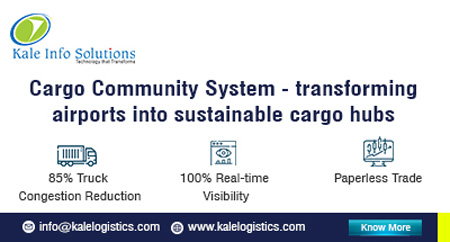

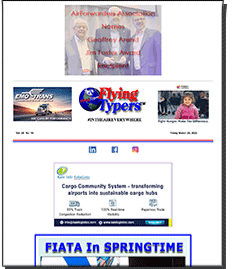 Vol. 24 No. 16
Vol. 24 No. 16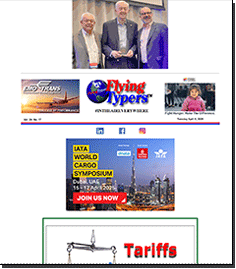 Vol. 24 No. 17
Vol. 24 No. 17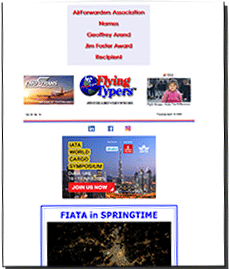 Vol. 24 No. 18
Vol. 24 No. 18